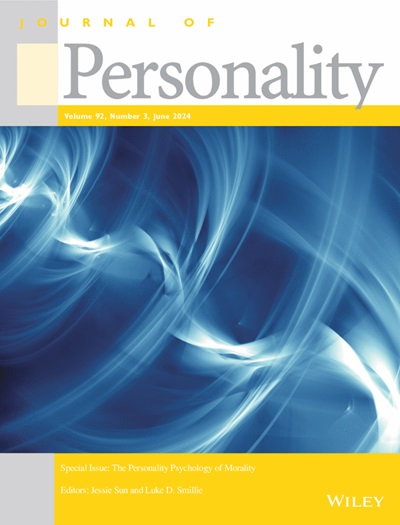Thoughts Falling Apart: Disorganized Schizotypy Specifically Predicts Both Psychotic‐ and Stress‐Reactivity in Daily Life
IF 2.7
1区 心理学
Q1 Psychology
引用次数: 0
Abstract
ObjectiveSchizotypal personality traits, such as unusual experiences, odd beliefs, or social anhedonia, predict psychotic‐like experiences (PLEs) and heightened stress‐reactivity in daily life. Yet, in previous studies, stressor appraisal, but not思想崩溃:无组织精神分裂特别预示着日常生活中的精神反应和压力反应
目的精神分裂型人格特征,如不寻常的经历、奇怪的信仰或社交快感缺乏,预示着日常生活中精神病样经历(ple)和高应激反应。然而,在以前的研究中,压力源评估(而不是暴露)被用来预测压力反应性,这可能是行为敏感化的结果,而不是有效的预测因素。方法对126名参与者进行了经验抽样研究,报告了他们的痛苦经历、事件评估和压力源暴露情况,得出了4611项观察结果。我们测试了分裂型特征与ple的关系,以及应激源暴露与事件不愉快的相互作用。结果无序型(非阳性或阴性)分裂型在应激源暴露增加的时期不仅预示着更强烈的ple,而且预示着更高的ple。然而,在较高的阴性分裂型中,这种对应激源的PLE反应被逆转。此外,总体而言,混乱程度较高的个体发现事件更令人不快,对他们来说,暴露于更多压力源与对事件的不快评价的急剧上升有关。结论在普通人群的日常生活中,紊乱可能是应激源相关的ple和负性事件评价增加的特定决定因素,而非正性或负性分裂型。这支持了无组织人格可能是压力相关心理健康障碍易感性的关键预测因子。
本文章由计算机程序翻译,如有差异,请以英文原文为准。
求助全文
约1分钟内获得全文
求助全文
来源期刊

Journal of Personality
PSYCHOLOGY, SOCIAL-
CiteScore
9.60
自引率
6.00%
发文量
100
期刊介绍:
Journal of Personality publishes scientific investigations in the field of personality. It focuses particularly on personality and behavior dynamics, personality development, and individual differences in the cognitive, affective, and interpersonal domains. The journal reflects and stimulates interest in the growth of new theoretical and methodological approaches in personality psychology.
 求助内容:
求助内容: 应助结果提醒方式:
应助结果提醒方式:


